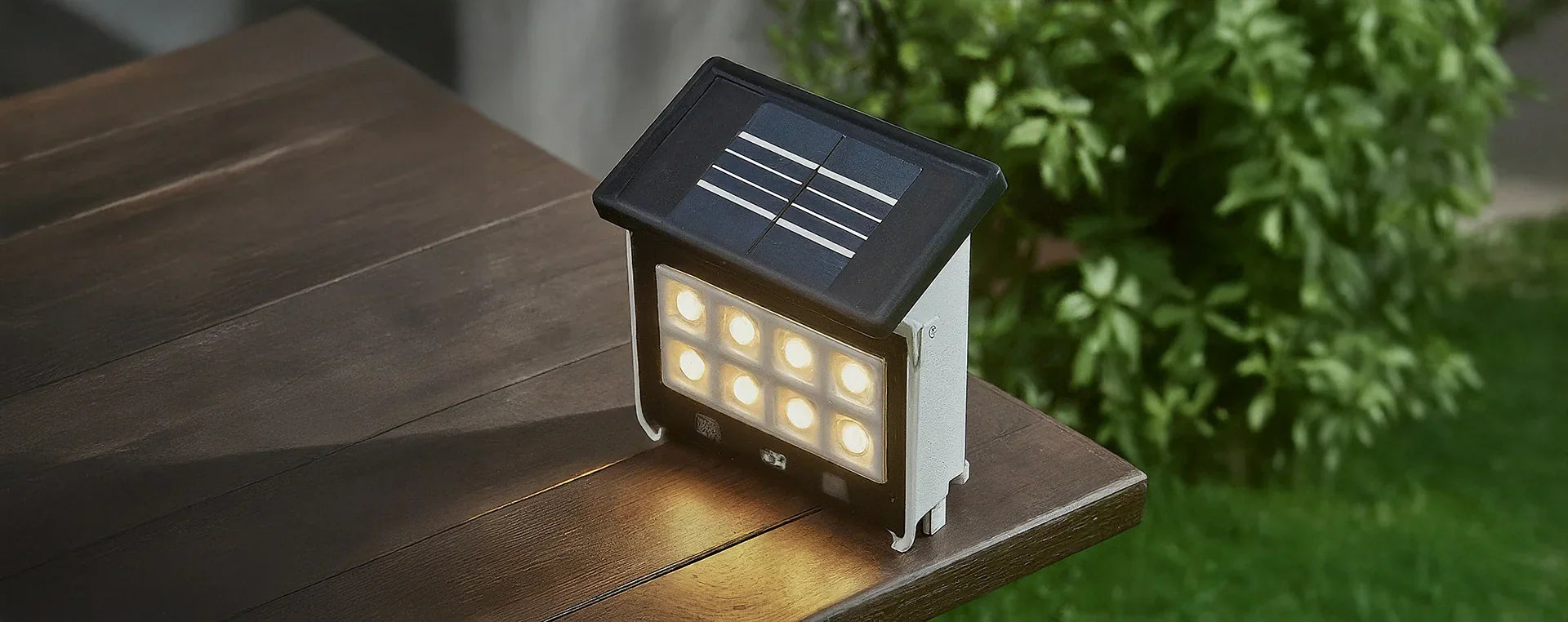Solar lights have revolutionized the outdoor and off-grid lighting landscape through a bright, efficient and very environmentally friendly approach to provide energy. At the heart of this technology stands the humble LED - Light Emitting Diode, which, today, has gained its preeminence as the most used light source in a solar-powered system. LED technology has many advantages that enhance the performance, longevity, and effectiveness of solar lights.

We will explore in this blog what are the main benefits of using LED lights in solar lighting and why it is most suitable for both homeowners and businesses alike.
1. Energy Efficiency
LEDs are highly efficient, with up to 90% of the consumed energy transferred to light. This is far superior to incandescent bulbs, which convert only a handful of their energy to light and waste most of it as heat. Combine this with the use of solar power - an inherently energy-efficient system - and LEDs translate into an ultra-low-power, high-output lighting solution.
This energy efficiency will allow the solar light to be operated for many more hours with little sunshine needed to charge the lights. In fact, on cloudy days, the LED fitted solar lights will store adequate amounts of energy that will last well into the night.
2. Long Time To Function
One of the exceptional benefits of the technology of an LED is its longevity. It can endure for up to 50,000 hours or more. On the other hand, conventional incandescent bulbs have short life spans at around 1,000 to 2,000 hours. Longer lifetime often equates to fewer replacements, lower maintenance costs, and minimized environmental impact in terms of manufacturing and disposing of the bulbs.
In the case of solar lights, that are installed in outdoor areas that are very hard to reach and which may include driveways, gardens, or along pathways, the long life of LEDs will be very valuable because once they have been installed you should not worry yourself about the need to change bulbs for many years. LEDs solar lights are therefore a hassle-free lighting option.
3. Toughness and Resistance to Bad Weather
LEDs have a very long lifespan compared to the traditional source of light, therefore they are perfect for the utilization of solar lights in outdoor settings. Since LEDs are solid-state lights and not like incandescent or fluorescent bulbs, they do not come with a fragile filament and glass enclosure that can break easily. This gives them much resistance to shock, vibrations, and harsh weather conditions such as rain, snow, or extreme heat.
Solar light LEDs will perform with all their strength for a full night long and do not lose any of their strengths due to the presence of a full year of weather conditions. They might be placed in a garden, driveway, or public space, but in all these cases, they will shine efficiently even in the most trying outside conditions.
4. Instant Illumination and Brightness
LEDs activate instantly, then can increase to maximum intensity within an instant of activation. This is particularly advantageous where solar lights have motion sensors or built-in timers. While fluorescent or incandescent bulbs have a 'warm-up' period, LEDs illuminate instantly, brightly, when motion is sensed or when activated by a timer switch.
The other benefit of LEDs is that they produce intense, coherent light. This makes them an excellent choice for solar street lights, security lights, and path lights in order to achieve bright, high-quality illumination. Again, many LED solar lights contain capabilities like dimmable brightness, so you can adjust how bright the light should be in relation to your required output.
5. Low Heat Output
Unlike the regular bulb, which converts a larger percentage of energy consumed into heat, LEDs emit very little heat in contrast. Heat emission is extremely low, besides being energy efficient, and can help improve safety, especially in outdoor use. The solar lights with LEDs can be hung out in the garden beds, or near plants, or even walkways without the danger of overheating, not to say damaging the surrounding area.
Low heat generation also results in an extended lifespan of the LED lights and the solar panels as excessive heat could damage the components gradually. This therefore makes the LED solar lights more reliable and durable.
6. Environmental Friendliness
Usage of LED technology in a solar light contributes to environmental sustainability. LEDs are free from dangerous chemicals such as mercury, which is typical in fluorescent lights. This has presented a safe usage and recyclable nature at the end of their life cycle. The other energy-efficient quality of an LED reduces general energy consumption, which consequently leads to less greenhouse gas emission.
LEDs, when combined with solar power—a renewable and clean energy source—offer a highly sustainable lighting solution minimizing the environmental impact. Using LED solar lights means that you are reducing your carbon footprint and creating a greener planet.
7. Versatility in Design
LEDs are highly versatile, so they can be used in several different forms for applications in solar light designs. From solar garden lights and pathway lights, to solar floodlights and street lights, LEDs can be applied depending on the different lighting needs and aesthetic preferences. Features such as color-changing options, dimming capability, and motion sensors come with many LED solar lights to allow you to have more flexibility for controlling your lighting environment.
This makes LED solar lights suitable for decorative purposes as well as functional, so those using the lighting would have to customize the lighting arrangement according to their specific needs and demands.
Conclusion: Why choose LED for solar lights?
This makes LEDs ideal in solar powered lighting systems, where they combine energy efficiency and durability and longevity. Again, they consume minimal energy but give bright, reliable illumination while requiring very little maintenance to feature a considerably lower impact on the environment compared to other conventional lighting options.



